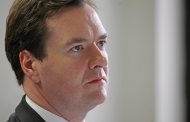The double-dip recession is deeper than originally feared as revised figures today showed a sharper decline in the economy in the final quarter of last year.
Gross domestic product (GDP) shrank by 0.4% between October and December, compared with a previous estimate of 0.3%, while the economy contracted by an unchanged 0.3% in the first quarter of this year, the Office for National Statistics (ONS) said.
The figures mean the current recession - defined as two or more quarters of declining GDP in a row - is more severe than first thought.
The impact of the weak economy was underlined by household spending figures, which showed expenditure falling by 0.1% compared with a previous estimate of 0.1% growth.
The downward revision will heap more pressure on the Government and fuel criticism that Chancellor George Osborne's austerity measures are choking off the recovery.
And in a further sign that the Chancellor's deficit-busting plans are struggling, Government spending grew at its fastest rate in nearly seven years between January and March, the ONS said.
The 1.9% surge in Government expenditure was driven by higher spending on public administration, health and defence.
Meanwhile, the decline in household expenditure in the first quarter was driven by a fall in spending on financial services and social protection.
The decreases were partially offset by spending on food and drink and recreation and culture.
The construction sector declined by a larger than previously estimated 4.9%, its worst performance since the first quarter of 2009.
Industrial production sector output, which includes manufacturing, was also revised downwards to a fall of 0.5% from a 0.4% decline.
Despite the overall decline in GDP, growth in the powerhouse service sector, which makes up 75% of the economy, was revised upwards from 0.1% to 0.2% in the first quarter.
Economists and business leaders have warned that a technical recession will hit confidence and could cause businesses to rein in spending at a time when they are being encouraged to invest to stimulate growth.
But the current downturn is expected to be nothing like as severe as the previous recession of 2008/09, which spanned more than a year.
©Press Association
©Press Association





